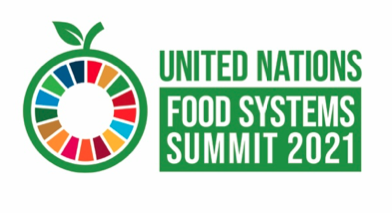Sustainable Food Systems
The UN Food System Summit

In 2021, UN Secretary-General António Guterres will convene a Food Systems Summit as part of the Decade of Action to achieve the Sustainable Development Goals (SDGs) by 2030. The Summit will launch bold new actions to deliver progress on all 17 SDGs, each of which relies to some degree on healthier, more sustainable and equitable food systems.
The Summit will awaken the world to the fact that we all must work together to transform the way the world produces, consumes and thinks about food. It is a summit for everyone everywhere – a people’s summit. It is also a solutions summit that will require everyone to take action to transform the world’s food systems.
Guided by five Action Tracks, the Summit will bring together key players from the worlds of science, business, policy, healthcare and academia, as well as farmers, indigenous people, youth organizations, consumer groups, environmental activists, and other key stakeholders. Before, during and after the Summit, these actors will come together to bring about tangible, positive changes to the world’s food systems.
Each track, with support from its corresponding chair and vice-chairs, is designed to address synergies as well as possible trade-offs with other tracks, and to identify bold new actions, innovative solutions, and strategies that can deliver wide-reaching benefits across all of the Sustainable Development Goals (SDGs). They are to create solutions at local, national, regional, and global levels and to scale up and to accelerate existing initiatives that align to the Summit vision and principles.
UN agencies will provide technical assistance as well as a link into the broader experience and expertise of the entire UN system, and oversee support for Summit follow-up activities. In addition, members of the Scientific Group will engage in each area to ensure the tracks are underpinned by robust evidence and science.
The following UN agencies have been selected as anchoring agencies for each action track:
- FAO - Action track 1: Ensuring access to safe and nutritious food for all
- WHO - Action track 2: Shifting to sustainable consumption patterns
- UNCCD - Action track 3: Boosting nature-positive production at scale
- IFAD - Action track 4: Advancing equitable livelihoods
- WFP - Action track 5: Building resilience to vulnerabilities, shocks and stresses
The Summit process aims to deliver the following outcomes:
- Generate significant action and measurable progress towards the 2030 Agenda for Sustainable Development. The Summit will succeed in identifying solutions and leaders, and issuing a call for action at all levels of the food system, including national and local governments, companies and citizens.
- Raise awareness and elevate public discussion about how reforming our food systems can help us all to achieve the SDGs by implementing reforms that are good for people and planet.
- Develop principles to guide governments and other stakeholders looking to leverage their food systems to support the SDGs. These principles will set an optimistic and encouraging vision in which food systems play a central role in building a fairer, more sustainable world. Principles of engagement
- Create a system of follow-up and review to ensure that the Summit’s outcomes continue to drive new actions and progress. This system will allow for the sharing of experiences, lessons and knowledge; it will also measure and analyse the Summit’s impact.
More information is available here





